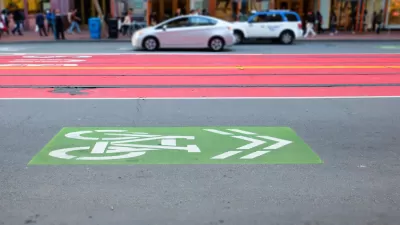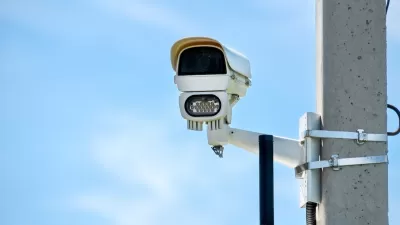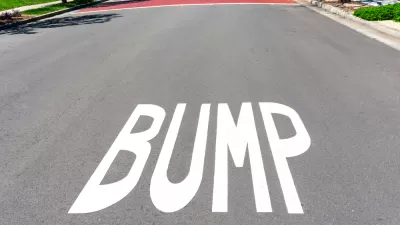As a leading bicycle advocacy organization withdraws support for police enforcement of Vision Zero plans, the discretionary practices of traffic enforcement come under rejuvenated scrutiny.

The Bicycle Coalition of Greater Philadelphia announces that it is adjusting its stance on Vision Zero—the term used to describe the global movement to eliminate traffic fatalities.
Vision Zero is a policy which emphasizes the “5 Es” of planning: engineering, education, encouragement, evaluation, and enforcement. “Enforcement” has always been the most controversial of the Es, and many organizations which focus on safe streets, like the Bicycle Coalition of Greater Philadelphia, have cautiously chalked up armed police enforcement as necessary to save lives.
But that was wrong.
According to the announcement, "armed police enforcement" has negative impacts for public safety, including in the process of reducing collisions on roadways. The announcement comes in response to calls by advocates, like Tamika Butler and Destiny Thomas, calling for a reconsideration of transportation planning innovations given the realities of public safety and policing for BIPOC.
The announcement also follows a newly rejuvenated discussion about the role of enforcement in policing the behavior of motorists. An article by Aaron Gordon ties data about traffic enforcement, to the doctrine police discretion and the public backlash against automated traffic enforcement (i.e., speed and red light cameras).
Gordon writes:
Regardless of which policy you personally prefer, any effort to eliminate racism in American policing must figure out what to do about traffic enforcement, which is the leading cause of interactions between police and the public, according to the Department of Justice. And, by law, it is almost entirely up to the officer whether to let the person go with a warning, give them a ticket, ask to search their vehicle, or escalate the situation even further. It is an interaction intentionally designed to let the officer do virtually whatever he or she wants, reflecting the inherent biases of our legal system.
That discretion favors white drivers, according to data cited by Gordon, which automated systems like speed and red light cameras short-circuit: "Today, we can still see how elemental discretion is to traffic enforcement, because we have an alternative, one many Americans loathe to the bone precisely because it had no discretion: automated enforcement cameras."
FULL STORY: We Are Dropping Police Enforcement From Vision Zero

Alabama: Trump Terminates Settlements for Black Communities Harmed By Raw Sewage
Trump deemed the landmark civil rights agreement “illegal DEI and environmental justice policy.”

Planetizen Federal Action Tracker
A weekly monitor of how Trump’s orders and actions are impacting planners and planning in America.

The 120 Year Old Tiny Home Villages That Sheltered San Francisco’s Earthquake Refugees
More than a century ago, San Francisco mobilized to house thousands of residents displaced by the 1906 earthquake. Could their strategy offer a model for the present?

LA’s Tree Emergency Goes Beyond Vandalism
After a vandal destroyed dozens of downtown LA trees, Mayor Karen Bass vowed to replace them. Days later, she slashed the city’s tree budget.

Sacramento Leads Nation With Bus-Mounted Bike Lane Enforcement Cameras
The city is the first to use its bus-mounted traffic enforcement system to cite drivers who park or drive in bike lanes.

Seattle Voters Approve Social Housing Referendum
Voters approved a corporate tax to fund the city’s housing authority despite an opposition campaign funded by Amazon and Microsoft.
Urban Design for Planners 1: Software Tools
This six-course series explores essential urban design concepts using open source software and equips planners with the tools they need to participate fully in the urban design process.
Planning for Universal Design
Learn the tools for implementing Universal Design in planning regulations.
Ada County Highway District
Clanton & Associates, Inc.
Jessamine County Fiscal Court
Institute for Housing and Urban Development Studies (IHS)
City of Grandview
Harvard GSD Executive Education
Toledo-Lucas County Plan Commissions
Salt Lake City
NYU Wagner Graduate School of Public Service





























